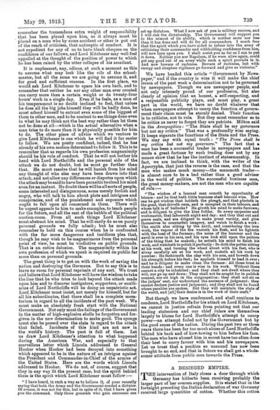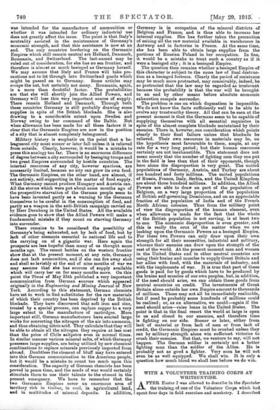A BESIEGED EMPIRE.
THE intervention of Italy closes a door through which Germany has hitherto been receiving probably the larger part of her oversea supplies. It is stated that in the fortnight preceding the Italian declaration of war Germany received large quantities of cotton. Whether this cotton was intended for the manufacture of ammunition or whether it was intended for ordinary industrial use does not greatly affect the issue. The point is that Italy's neutrality assisted in the maintenance of Germany's economic strength, and that this assistance is now at an end. The only countries bordering on the Germanic Empires which still remain neutral are Holland, Denmark, Roumania, and Switzerland. The last-named may be ruled out of consideration, for she has no sea frontier, and therefore is almost as much besieged as Germany herself. We may assume that Italy and France will take pre- cautions not to let through into Switzerland goods which might be passed on to Germany. Some articles may escape the net, but certainly not many. Roumania, again, is a more than doubtful factor. The probabilities are that she will shortly join the Allied Powers, and Germany will lose this very important source of supply. There remain Holland and Denmark. Through both these countries Germany is still probably drawing some supplies in spite of the British blockade. She is also drawing to a considerable extent upon Sweden and Norway owing to her command of the Baltic. But when allowance has been made for all these factors it is clear that the Germanic Empires are now in the position of a city that is almost completely beleaguered.
Military history is emphatic on the point that a be- leaguered city must sooner or later fall unless it in relieved from outside. Clearly, however, it would be a mistake to press this analogy too far. There is an enormous difference of degree between a city surrounded by besieging troops and two great Empires surrounded by hostile countries. The internal resources of any city, however spacious, are necessarily limited, because no city can grow its own food. The Germanic Empires, on the other hand, are almost, if not entirely, self-supporting in the matter of food supply. What Germany cannot produce Hungary and Austria can. All the stories which were put about some months ago of the prospective starvation of the German people seem to have been invented partly as a warning to the Germans themselves to be careful in the consumption of food, and partly se a weapon in the anti-British campaign carried on by Herr Dernburg in the United States. All the available evidence goes to show that the Allied Powers will make a fundamental mistake if they count on starving Germany into surrender.
There remains to be considered the possibility of Germany's being exhausted, not by lack of food, but by lack of other elements essential to national life and to the carrying on of a gigantic war. Here again the prospects are less hopeful than many of us thought some months ago. The recent battles on the western frontier show that at the present moment, at any rate, Germany does not lack ammunition, and if she can fire away shot and shell so lavishly at the end of nine months of war we may assume that she has sources of supply available which will carry her on for many months more. On this point the Times of May 25th published a very important communication from German sources which appeared originally in the Engineering and Mining Journal of New York. According to this statement, German chemists hays set to work to find substitutes for the raw materials of which their country has been deprived by the British blockade. They have discovered that soft iron and zinc, treated by a special process, can replace copper to a very large extent in the manufacture of cartridges. More important still, German manufacturers have erected large works for converting the nitrogen of the air into ammonia, and thus obtaining nitric acid. They calculate that they will be able to obtain all the nitrogen they require at lees cost than the price of Chile saltpetre even in normal times. In similar manner various mineral salts, of which Germany poetesses large supplies, are being utilized by new chemical combinations to replace minerals previously imported from abroad. Doubtless the element of bluff may have entered into this German communication to the American people, but it would be a mistake to count too much upon this consideration. The capacity of German chemists has been proved in peace time, and the needs of war would certainly stimulate them to use their talents to the utmost in the present emergency. We have to remember that the two Germanic Empires cover an enormous area of territory rich in timber, in coal, in agricultural land, and in multitudes of mineral deposits. In addition,
Germany is in occupation of the mineral districts of Belgium and France, and is thus able to increase her internal supplies. She has further taken the precaution of seizing all the raw material available in warehouses in Antwerp and in factories in France. At the same time, she has been able to obtain large supplies from the portions of Russian Poland in her occupation. In fine, it would be a mistake to treat such a country as if it were a besieged city ; it is a besieged Empire. The question then remains whether a besieged Empire of this character is subject to the same law of final destruc- tion ae a besieged fortress. Clearly the period of resistance may be much more protracted, may conceivably, indeed, be so protracted that the law may be regarded as irrelevant because the probability is that the war will be brought to an end by other means before absolute economics exhaustion compels surrender.
The problem is one on which dogmatism is impossible. We do not know the facts sufficiently well to be able to evolve any trustworthy theory. All that can be seen at the present moment is that the Germans seem to be capable of supplying themselves with all essential requisites in spite of the almost complete blockade maintained by their enemies. There is, however, one consideration which points clearly to their final failure unless that blockade be relieved. Their own resources in materials may be, on the hypothesis most favourable to them, ample, at any rate for a very long period; but their human resources certainly are not inexhaustible. This statement does not mean merely that the number of fighting men they can put in the field is less than that of their opponents, though here alone the disproportion is very great. The united populations of Germany, Austria, and Turkey are about one hundred and forty millions. The united populations of Russia, France, Italy, Serbia, and the United Kingdom are about three hundred millions. In addition, the Allied Powers are able to draw on part of the population of Belgium, on a very large proportion of the population of British self-governing Dominions, and on an appreciable fraction of the population of India and of the French North African colonies. Thus from the military point of view the disproportion of the human element, even when allowance is made for the fact that the whole of the British population is not serving, is at least two to one. The economic disproportion is even greater, and this is really the crux of the matter when we are looking upon the Germanic Powers as a besieged Empire. For these two Powers can only draw upon their own strength for all their necessities, industrial and military, whereas their enemies can draw upon the strength of the rest of the world. At the present moment men and women in the United States and in other neutral countries are using their brains and muscles to supply Great Britain and her allies with food, with the materials of industry, and with the implements of war. It is true that part of these goods is paid for by goods which have to be produced by the brains and muscles of our own peoples, but, in addition, if the need should arise, we can obtain these goods from neutral countries on credit. The investments of Great Britain alone outside her own Empire amount to thousands of millions. These may not all be immediately realizable, but if need be probably some hundreds of millions could be realized; or, as an alternative, we could—again if the need should arise—raise loans in the United States. The point is that in the final resort the world at large is open to us and closed to our enemies, and therefore time is fighting on our side. Sooner or later, either from lack of material or from lack of men or from lack of credit, the Germanic Empires must be crushed unless they can by military strength alone win sufficient victories to crush their enemies. But that, we venture to say, will not happen. The German soldier is certainly not a better fighting man than the soldier of the Allies. He is probably not as good a fighter. Very soon he will not even be as well equipped. We shall win. It is only a question how much blood we shall lose before we do win.



































 Previous page
Previous page